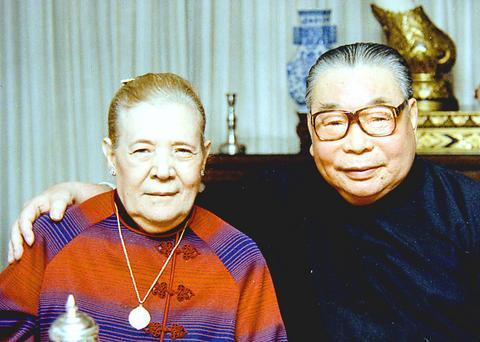Taiwan's Soviet-born former first lady Faina Chiang Fang-liang (
"At 11:45am today, Chiang experienced a sudden drop in blood pressure and ventricular fibrillation. The medical team's efforts at resuscitation unfortunately failed," said Lee Shou-tung (

PHOTO: AFP
Lee said that Chiang checked into the hospital on Oct. 6, displaying inflammation of the oesophagus and acute asthma. Her condition had stabilized after treatment.

PHOTO: AFP
In addition to chronic obstructive pulmonary disease, Chiang had also battled with diabetes and a heart condition over a long period.
Once the news of her death broke, a number of senior government officials and representatives of political parties visited Chiang's family to express their condolences.
In the afternoon, President Chen Shui-bian (
"Though Chiang was born in Siberia, she displayed the virtues of a traditional Chinese woman -- she was a good mother and a good wife who always put her family before everything else," Chen said.
Vice President Annette Lu (
Taipei Mayor Ma Ying-jeou (
People First Party (PFP) Chair-man James Soong (宋楚瑜), who also served as Chiang Ching-kuo's English secretary, sent PFP Vice Chairman Chang Chao-hsiung (張昭雄) to meet Chiang's family in his absence. Soong is in San Francisco.
In a statement, Soong said that Chiang's "quiet and sparing lifestyle" was to be commended. He also telephoned Chiang's family in Taiwan to express his condolences.
Chinese Nationalist Party (KMT) Chairman Lien Chan (連戰), after visiting Chiang's family at the hospital, said that the KMT would do its best to assist them with funeral arrangements.
After his own visit to the hospital, Premier Yu Shyi-kun said the Executive Yuan would provide assistance for the funeral and burial.
The Ministry of National Defense is understood to have set aside space for her in the military mausoleum on Wuzhishan to the northwest of Taipei, next to the plot where her husband's body will be moved from his current, temporary resting place.
The remains of Chiang Ching-kuo and his father, former president Chiang Kai-shek (
In January, Chiang Fang-liang asked the defense ministry to have the two late KMT presidents buried at the Wuzhishan site.
Construction of the site will not be completed until June next year, meaning that Chiang will not be able to be buried there until that time.
Also see story:

Intelligence agents have recorded 510,000 instances of “controversial information” being spread online by the Chinese Communist Party (CCP) so far this year, the National Security Bureau (NSB) said in a report yesterday, as it warned of artificial intelligence (AI) being employed to generate destabilizing misinformation. The bureau submitted a written report to the Legislative Yuan in preparation for National Security Bureau Director-General Tsai Ming-yen’s (蔡明彥) appearance before the Foreign Affairs and National Defense Committee today. The CCP has been using cognitive warfare to divide Taiwanese society by commenting on controversial issues such as Taiwan Semiconductor Manufacturing Co’s (TSMC, 台積電) investments in the

HELPING HAND: The steering committee of the National Stabilization Fund is expected to hold a meeting to discuss how and when to utilize the fund to help buffer the sell-off The TAIEX plunged 2,065.87 points, or 9.7 percent, to close at 19,232.35 yesterday, the highest single-day percentage loss on record, as investors braced for US President Donald Trump’s tariffs after an extended holiday weekend. Amid the pessimistic atmosphere, 945 listed companies led by large-cap stocks — including Taiwan Semiconductor Manufacturing Co (TSMC, 台積電), Hon Hai Precision Industry Co (鴻海精密) and Largan Precision Co (大立光) — fell by the daily maximum of 10 percent at the close, Taiwan Stock Exchange data showed. The number of listed companies ending limit-down set a new record, the exchange said. The TAIEX plunged by daily maxiumu in just

INVESTIGATION: The case is the latest instance of a DPP figure being implicated in an espionage network accused of allegedly leaking information to Chinese intelligence Democratic Progressive Party (DPP) member Ho Jen-chieh (何仁傑) was detained and held incommunicado yesterday on suspicion of spying for China during his tenure as assistant to then-minister of foreign affairs Joseph Wu (吳釗燮). The Taipei District Prosecutors’ Office said Ho was implicated during its investigation into alleged spying activities by former Presidential Office consultant Wu Shang-yu (吳尚雨). Prosecutors said there is reason to believe Ho breached the National Security Act (國家安全法) by leaking classified Ministry of Foreign Affairs information to Chinese intelligence. Following interrogation, prosecutors petitioned the Taipei District Court to detain Ho, citing concerns over potential collusion or tampering of evidence. The

‘COMPREHENSIVE PLAN’: Lin Chia-lung said that the government was ready to talk about a variety of issues, including investment in and purchases from the US The National Stabilization Fund (NSF) yesterday announced that it would step in to staunch stock market losses for the ninth time in the nation’s history. An NSF board meeting, originally scheduled for Monday next week, was moved to yesterday after stocks plummeted in the wake of US President Donald Trump’s announcement of 32 percent tariffs on Taiwan on Wednesday last week. Board members voted to support the stock market with the NT$500 billion (US$15.15 billion) fund, with injections of funds to begin as soon as today. The NSF in 2000 injected NT$120 billion to stabilize stocks, the most ever. The lowest amount it